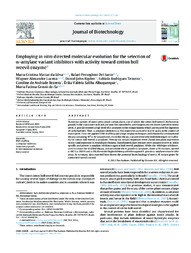Employing in vitro directed molecular evolution for the selection of ?-amylase variant inhibitors with activity toward cotton boll weevil enzyme.
Employing in vitro directed molecular evolution for the selection of ?-amylase variant inhibitors with activity toward cotton boll weevil enzyme.
Author(s): SILVA, M. C. M. da; SARTO, R. P. del; LUCENA, W. A.; RIGDEN, D. J.; TEIXEIRA, F. R.; BEZERRA, C. de A.; ALBUQUERQUE, E. V. S.; GROSSI DE SA, M. F.
Summary: Numerous species of insect pests attack cotton plants, out of which the cotton boll weevil (Anthonomus grandis) is the main insect in Brazil and must be controlled to avert large economic losses. Like other insect pests, A. grandis secretes a high level of -amylases in the midgut lumen, which are required for digestion of carbohydrates. Thus, -amylase inhibitors (-AIs) represent a powerful tool to apply in the control of insect pests. Here, we applied DNA shuffling and phage display techniques and obtained a combinatorial library containing 108 ˛-AI variant forms. From this library, variants were selected exhibiting in vitro affinity for cotton boll weevil -amylases. Twenty-six variant sequences were cloned into plant expression vectors and expressed in Arabidopsis thaliana. Transformed plant extracts were assayed in vitro to select specific and potent -amylase inhibitors against boll weevil amylases. While the wild type inhibitors, used to create the shuffled library, did not inhibit the A. grandis -amylases, three -AI mutants, named -AIC3, -AIA11 and -AIG4 revealed high inhibitory activities against A. grandis -amylases in an in vitro assay. In summary, data reported here shown the potential biotechnology of new ˛-AI variant genes for cotton boll weevil control.
Publication year: 2013
Types of publication: Journal article
Observation
Some of Embrapa's publications are published as ePub files. To read them, use or download one of the following free software options to your computer or mobile device. Android: Google Play Books; IOS: iBooks; Windows and Linux: Calibre.
Access other publications
Access the Agricultural Research Database (BDPA) to consult Embrapa's full library collection and records.
Visit Embrapa Bookstore to purchase books and other publications sold by Embrapa.

